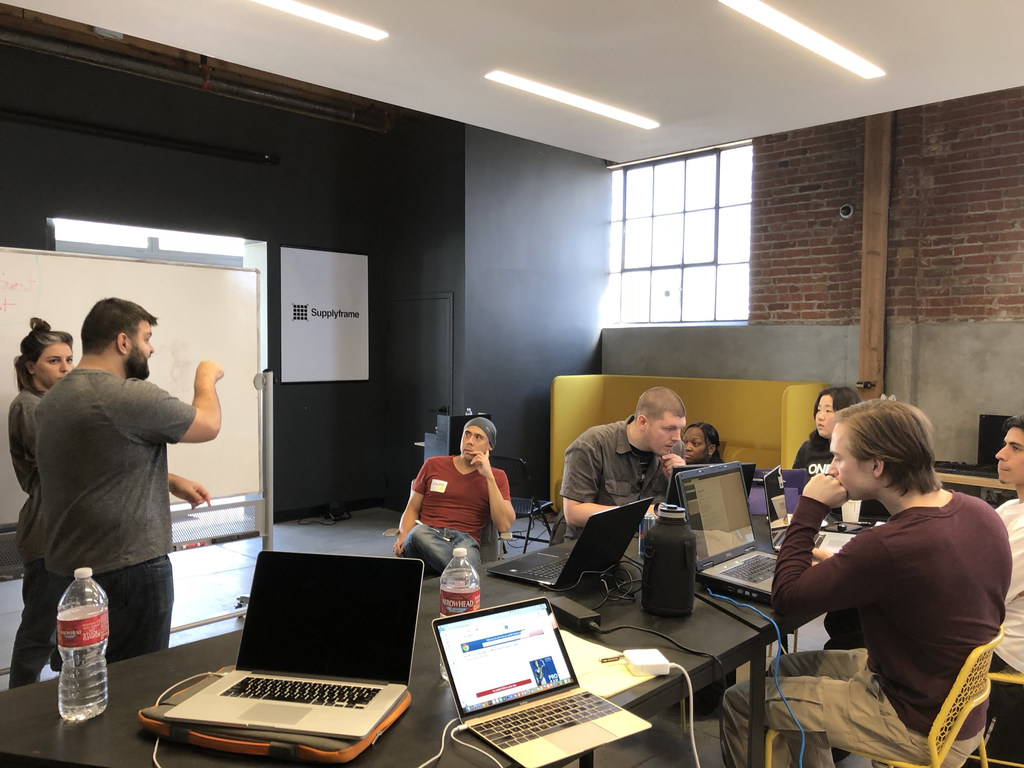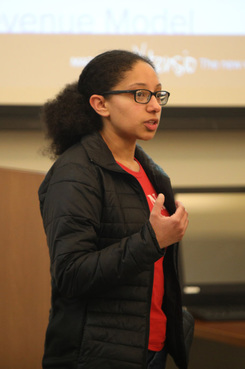Got a Legal Problem? These Law Students Can Solve It with Tech
Law students from around the country joined lawyers, web developers and other legal innovators in harnessing technology to address legal problems as part of the 2018 Global Legal Hackathon.
March 01, 2018 at 02:28 PM
7 minute read

Students from several law schools across the country set their casebooks aside to join lawyers, legal technology innovators, web engineers and others in the first-ever Global Legal Hackathon last weekend.
For three days, Hackathon participants brainstormed how to harness technology to solve legal problems, formed teams to pursue those ventures, and pitched their ideas to judges. Local hackathons were held in 40 cities in 20 different countries, and the best eight ideas will be presented in New York in April.
For the law students, the Hackathon offered an opportunity to rub elbows with those on the cutting edge of legal technology and innovation and get hands-on experience developing the types of legal programs that are revolutionizing legal practice. (You can read more about the winning team in San Francisco, which included two students from the University of California, Berkeley School of Law, here.)
We caught up with Hackathon participants from the University of Southern California Gould School of Law; Suffolk University Law School; Brigham Young University J. Rueben Clark Law School; and Pennsylvania State University School of Law to learn about the projects they developed.
Aram Ekimyan, University of Southern California Gould School of Law
Roughly 1 million Californians are eligible to have their misdemeanor marijuana convictions expunged now that recreational cannabis is legal in the state. Yet only 5,000 people have thus far cleared their records.
Aram Ekimyan, a third-year law student at USC, suggested at the Los Angeles Hackathon site the creation of a website that would make the expungement process straightforward, fast, and cheap.
“I thought it was something that was very practical,” he said. “It might seem very small, but [expungement] can change a person's life.”
Dorna Moini, the attorney founder of HelpSelf Legal, got on board and helped Ekimyan develop a prototype website that helps users file expungement applications. The site translates legalese into layman's terms and fills out the necessary paperwork. It also includes a function that helps users to quickly track down their criminal records, which eliminates a months-long wait if applicants have to request their relevant records from the California State Department of Justice. Finally, the site would cost users just $100, as opposed to $500 or more to hire a lawyer. It would also help users automatically apply for a waiver of California's expungement fee if they can't afford it.
“The whole idea was to make the process more efficient and cheaper,” Akimyan said.
The judges liked what they saw. The expungement website was selected as the winner of Los Angeles Hackathon, and Akimyan and Moini are moving on the next round of the competition.
Anthony Metzler, Suffolk University Law School
What if there was an equivalent of Amazon's Alexa for alternative dispute resolution?
That was idea that Suffolk second-year law student Anthony Metzler struck upon with a classmate and lawyer who formed a team at the Boston Hackathon. They wanted to figure out how to eliminate the emotional elements of mediation and automate the process to ensure impartiality. Online alternative dispute resolution tools already exist, so they settled on a unique twist: employ a hologram.
Under the team's proposal, parties would sit in separate rooms and interface with a hologram serving as the mediator. The hologram would function much like a legal Alexa, answering questions and offering impartial guidance.
“Our mediator would take the human element out of it, and everything would be backed up factually,” Metzler said.
For example, if a divorced couple disagreed about the amount of money to spend on their child's summer camp, the hologram mediator could instantly and impartially provide the average cost of summer camp in the area, Metzler said.
The software would initially be made free to courts in order to build the product's reputation, the team decided, but would ultimately cost a fee.
The Boston judges picked a different project as the local winner—a shared database for non-profit legal services providers to store client intake information—but developing a legal technology product idea and creating a business plan was a valuable experience, Metzler said.
“I think people get caught up in the idea of, 'I'm not a programmer so I can't do that,'” he said. “This weekend proved that you don't need coding experience to come up with good ideas.”
Brianna Rosier, Brigham Young University J. Rueben Clark Law School
Initial lawyer consultations take time and don't always bear fruit for either the attorney or the potential client. That's why BYU second-year Brianna Rosier and her two teammates at the Provo, Utah, Hackathon site decided to create a chat bot to help people determine whether or not they need a lawyer.

“We called it The Legal Concierge, because it directs you to where you need to go—whether that's a lawyer, or just to information or to a government website where you can get forms and things like that,” Rosier said. “The idea is to eliminate some of the time and money concerns that come with initial consultations for both lawyers and consumers.”
Rosier offered the example of someone who slipped and fell while at work. The chat bot asks questions about where the accident occurred, what type of accident it was, and other questions related to the potential claim. It would then determine whether or not the user should contact an attorney for assistance.
Rosier worked on the chat bot with an MBA student from BYU as well as a computer programmer. She supplied the legal knowledge and worked on the business plan, while her teammates did most of the work developing the site, which is functional though bare-bones at this point.
The Legal Concierge would be free for users, but attorneys would pay to have it embedded on their own websites. Attorneys could also contract with the site to receive referrals when users are directed to contact an attorney, Rosier said.
The Legal Concierge was chosen as the winner of the Provo site, with the judges noting that it could be deployed in the self-help areas of courthouses.
Hamed Azimi, Pennsylvania State University School of Law
Hamed Azimi, an LL.M. student from Iran, noticed that many of his fellow international law students were struggling to keep their class notes organized.
So when he heard about the upcoming Hackathon, it seemed like a perfect opportunity to tackle the problem. He partnered with two undergraduate students from Penn State's College of Information Sciences and Technology to create a note taking application for law students.
“It creates notes in a very efficient way. You just need to open the note creator, take your notes, and leave it. There's no upload or confirmation process. The concept is something that has been done before, but we decided to do it in a way that will save you time and increase your productivity.”
The application gives users the ability to create reminders for upcoming exams or other deadlines. It also includes a recording feature to allow users to go back and track lectures, as well as options to customize notes. (It also features a two-step deletion process, meaning users can't accidently trash their notes.) The application would be free.
“I was talking to other international students,” he said. “They needed some tools—some were taking notes manually on paper. But the existing note helpers have two problems. One is that you have to pay for them, and the other is that they usually have lots of features. But having tons of features doesn't necessarily mean they're good. I listened to the international students to see what they really need, not just what I can implement.”
This content has been archived. It is available through our partners, LexisNexis® and Bloomberg Law.
To view this content, please continue to their sites.
Not a Lexis Subscriber?
Subscribe Now
Not a Bloomberg Law Subscriber?
Subscribe Now
NOT FOR REPRINT
© 2025 ALM Global, LLC, All Rights Reserved. Request academic re-use from www.copyright.com. All other uses, submit a request to [email protected]. For more information visit Asset & Logo Licensing.
You Might Like
View All

University of Chicago Accused of Evicting Student for Attending Gaza-Israel Protest
3 minute read
Sanctioned Penn Law Professor Amy Wax Sues University, Alleging Discrimination
5 minute read
Trending Stories
- 1Internal Whistleblowing Surged Globally in 2024, so Why Were US Numbers Flat?
- 2In Resolved Lawsuit, Jim Walden Alleged 'Retaliatory' Silencing by X of His Personal Social Media Account
- 3Government Attorneys Face Reassignment, Rescinded Job Offers in First Days of Trump Administration
- 4Disney Legal Chief Sees Pay Surge 36%
- 5Legaltech Rundown: Consilio Launches Legal Privilege Review Tool, Luminance Opens North American Offices, and More
Who Got The Work
J. Brugh Lower of Gibbons has entered an appearance for industrial equipment supplier Devco Corporation in a pending trademark infringement lawsuit. The suit, accusing the defendant of selling knock-off Graco products, was filed Dec. 18 in New Jersey District Court by Rivkin Radler on behalf of Graco Inc. and Graco Minnesota. The case, assigned to U.S. District Judge Zahid N. Quraishi, is 3:24-cv-11294, Graco Inc. et al v. Devco Corporation.
Who Got The Work
Rebecca Maller-Stein and Kent A. Yalowitz of Arnold & Porter Kaye Scholer have entered their appearances for Hanaco Venture Capital and its executives, Lior Prosor and David Frankel, in a pending securities lawsuit. The action, filed on Dec. 24 in New York Southern District Court by Zell, Aron & Co. on behalf of Goldeneye Advisors, accuses the defendants of negligently and fraudulently managing the plaintiff's $1 million investment. The case, assigned to U.S. District Judge Vernon S. Broderick, is 1:24-cv-09918, Goldeneye Advisors, LLC v. Hanaco Venture Capital, Ltd. et al.
Who Got The Work
Attorneys from A&O Shearman has stepped in as defense counsel for Toronto-Dominion Bank and other defendants in a pending securities class action. The suit, filed Dec. 11 in New York Southern District Court by Bleichmar Fonti & Auld, accuses the defendants of concealing the bank's 'pervasive' deficiencies in regards to its compliance with the Bank Secrecy Act and the quality of its anti-money laundering controls. The case, assigned to U.S. District Judge Arun Subramanian, is 1:24-cv-09445, Gonzalez v. The Toronto-Dominion Bank et al.
Who Got The Work
Crown Castle International, a Pennsylvania company providing shared communications infrastructure, has turned to Luke D. Wolf of Gordon Rees Scully Mansukhani to fend off a pending breach-of-contract lawsuit. The court action, filed Nov. 25 in Michigan Eastern District Court by Hooper Hathaway PC on behalf of The Town Residences LLC, accuses Crown Castle of failing to transfer approximately $30,000 in utility payments from T-Mobile in breach of a roof-top lease and assignment agreement. The case, assigned to U.S. District Judge Susan K. Declercq, is 2:24-cv-13131, The Town Residences LLC v. T-Mobile US, Inc. et al.
Who Got The Work
Wilfred P. Coronato and Daniel M. Schwartz of McCarter & English have stepped in as defense counsel to Electrolux Home Products Inc. in a pending product liability lawsuit. The court action, filed Nov. 26 in New York Eastern District Court by Poulos Lopiccolo PC and Nagel Rice LLP on behalf of David Stern, alleges that the defendant's refrigerators’ drawers and shelving repeatedly break and fall apart within months after purchase. The case, assigned to U.S. District Judge Joan M. Azrack, is 2:24-cv-08204, Stern v. Electrolux Home Products, Inc.
Featured Firms
Law Offices of Gary Martin Hays & Associates, P.C.
(470) 294-1674
Law Offices of Mark E. Salomone
(857) 444-6468
Smith & Hassler
(713) 739-1250








